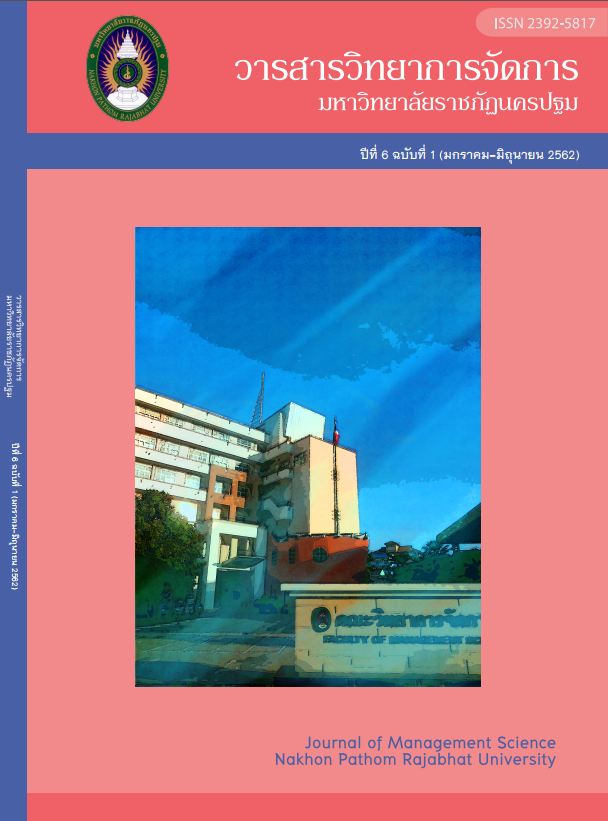Employee-Centered Climate and organizational citizenship behaviors Affecting the commitment of car repair staff in Nakhon Pathom Province
Main Article Content
Abstract
This research aims to 1. Study the commitment of car repair staff in Nakhon Pathom Province when classified by personal factors and 2. Study of Employee-Centered Climate and organizational citizenship behaviors affecting the commitment of car repair staff in Nakhon Pathom Province. The researcher collected 400 employees working in the car garage in Nakhon Pathom Province by convenient random sampling. Analyzed by percentage Mean,SD. One-way ANOVA Pearson correlation analysis and multiple regression analysis
The research found that
1. Study the commitment of car garage employees in Nakhon Pathom province with different age and education level With statistical significance at the level of .05
2. Employee-Centered Climate that affects the commitment of the car garage staff in Nakhon Pathom Province, including providing independence in the operation X3 (b = 0.20). Commitment of car repair staff in Nakhon Pathom, namely as for organizational citizenship behaviors that affects the commitment of the car garage staff in Nakhon Pathom, such as Altruism X5 (b = 0.23) Consciousness X8 (b = 0.17) and Self-Development X11(b = 0.16) With all independent variables having 69 percent accuracy in forecasting and can write equations Commitment of car repair staff in Nakhon Pathom province as follows. Y=0.35+0.10X1+0.02X2+0.20X3*+0.02X4+0.23X5*+0.03X6+0.01X7+0.17X8*+0.07X9+0.04X10+0.16X11*
Article history : Received 10 January 2019
Revised 24 April 2019
Accepted 30 April 2019
SIMILARITY INDEX = 1.23
Article Details
The views and opinions of the article appearing in this journal are those of the author. It is not considered a view and responsibility of the editorial staff.
References
จีระวุฒิ สุขผล. (2560).ความสัมพันธ์ระหว่างสวัสดิการกับความผูกพันในองค์กรตามความคิดเห็นของพนักงาน อู่ซ่อมบำรุงรถยนต์ในจังหวัดนครปฐม.วารสารวิทยาการจัดการมหาวิทยาลัยราชภัฎนครปฐม. 4 (1). 47-61.
นันทนา มาศภากร. (2561).ปัจจัยวัฒนธรรมองค์การที่ส่งผลต่อความผูกพันในองค์การของพนักงานอุตสาหกรรมเซรามิกส์ จังหวัดราชบุรี.วารสารวิทยาการจัดการมหาวิทยาลัยราชภัฎนครปฐม. 5 (1).31-43.
นูรีมัน ดอเลาะ อนิวัช แก้วจำนงค์ อรจันทร์ ศิริโชติ. (2556).ความผูกพันต่อองค์การของบุคลากรมหาวิทยาลัยนราธิวาสราชนครินทร์. วารสารมหาวิทยาลัยนราธิวาสราชนครินทร์. 5 (3).110-121.
ภัทธราภรณ์ อัญชลีอำนวยพร.(2561).แนวทางการสร้างความผูกพันและพฤติกรรมการเป็นสมาชิกที่ดีขององค์การบุคลากร โรงพยาบาลเมตตาประชารักษ์ (วัดไร่ขิง).วารสารวิทยาการจัดการมหาวิทยาลัยราชภัฎนครปฐม. 5 (1).14-30.
รุ่งโรจน์ อรรถานิทธิ์. (2554) .การสร้างความผูกพันของพนักงานในองค์กร.กรุงเทพฯ : เอช อาร์ เซ็นเตอร์.
วิลาสินี เจนวณิชสถาพร (2556).ความสัมพันธ์ระหว่างคุณภาพชีวิตการทำงานกับความผูกพันต่อองค์การของพนักงานระดับปฎิบัติการ กลุ่มบริษัทโทเรในประเทศไทย.การค้นคว้าอิสระ สาขาวิชาการประกอบการ.มหาวิทยาลัยศิลปากร.
สาธิต สุวรรณประกร และสมยศ อวเกียรติ. (2559). ปัจจัยที่ส่งผลต่อผลการปฏิบัติงานของพนักงานรักษาความปลอดภัย.วารสารเกษมบัณฑิต. 17 (1).56-72.
สุนทร พิกุลหอม (2555). ความผูกพันต่อองค์กรของบุคลากรที่ปฏิบัติงานในองค์กรปกครองท้องถิ่น ในเขตพื้นที่อําเภอสอยดาว จังหวัดจันทบุรี. ปัญหาพิเศษรัฐประศาสนศาสตรมหาบัณฑิต. สาขาวิชาการจัดการภาครัฐและเอกชน. วิทยาลัยการบริหารรัฐกิจ. มหาวิทยาลัยบูรพา.
สุวิมล พิชญไพบูลย์. (2560).ปัจจัยเชิงเหตุและผลของความผูกพันกับองค์กรที่มีต่อการปฏิบัติงานของบุคลากรในมหาวิทยาลัยเทคโนโลยีราชมงคลกรุงเทพ.วารสารบัณฑิตศึกษา มหาวิทยาลัยราชภัฎวไลยอลงกรณ์ ในพระบรมราชูปถัมภ์. 11 (1).174-179.
Cochran, W.G. (1953). Sampling Techniques. New York : John Wiley & Sons. Inc.
Esmaeili, M. R., Pirzad, A., & Jafarineshad, S. M. (2014). Organizational climate effect on organizational citizenship behavior outbreak. Reef Resources Assessment and Management Technical Paper. 43(4), 344-349.
Kahn, W.A. (1990). Psychological conditions of personal engagement and disengagement at work. Academy of Management Journal. 33,692-724.
Podsakoff, MacKenzie, Paine & Bachrach .(2000). Organizational citizenship behaviors: a critical review of the theoretical and empirical literature and suggestions for future research. Journal of Management. 26 (3):513-563 • DOI : 10.1177/014920630002600306..


